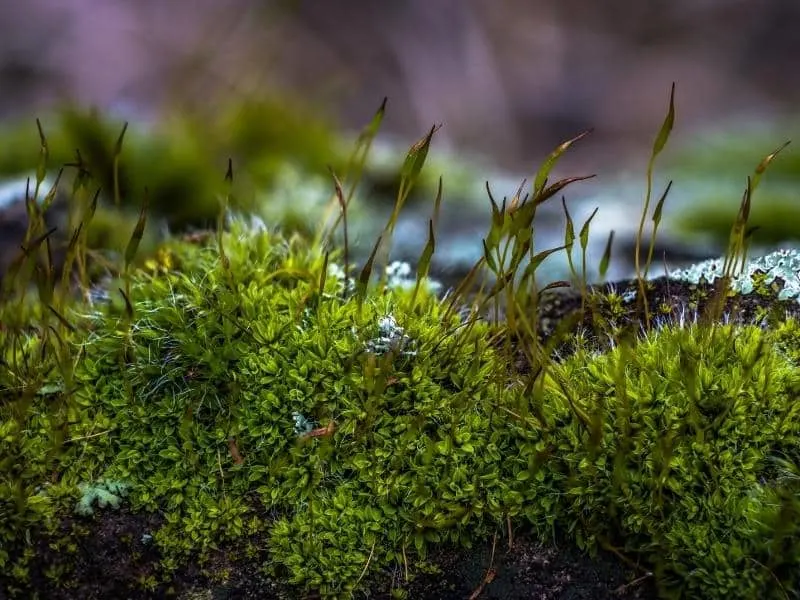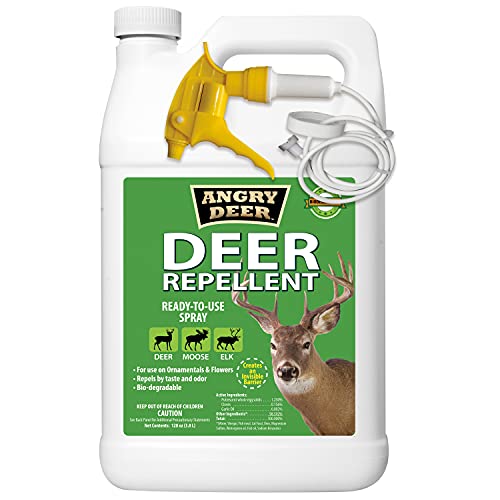Deer are adorable. Their presence in the woods is majestic. Witnessing the calm and quiet behavior of deer, it looks like they lead a simple peaceful life. But when you peep through the food habits and behavior of a deer you’ll learn how interesting their food choice is!
While learning about the lifestyle of deer, you may wonder what they eat or what attracts those crowned animals. Since deer are known as herbivores, you might want to know if they eat moss too. Here we’ve focused on this question while covering other related queries about deer.
Do deer eat moss?
Moss isn’t a common food item for every species of deer. Though deer are herbivores, most deer do not like to eat moss. But a few species of deer such as reindeer and whitetail deer eat different types of moss in the winter to stay warm in the cold. Some deer eat moss out of interest too.
Table of Contents

Deer live on plant-based food as they are herbivores. But they don’t usually eat moss as their main meal. Most variants of moss are deer-resistant such as scotch moss, Irish moss, club moss, etc. Either they are of a strong smell, toxic or distasteful.
But in a few regions, some deer have moss, for example Spanish moss and reindeer moss as a primary meal. Reindeer love to eat reindeer moss a lot. Besides, they sometimes eat sphagnum moss. White-tail deer often have Spanish moss.
But most deer don’t eat moss, instead they avoid it.
Many types of moss can be found. Among them, there is some moss that deer eat and some they avoid. Deer’s appetite for different moss is given below.
Irish moss:
Irish moss is a deer repellent. That means, if you grow Irish moss on your lawn, its strong fragrance will keep your lawn deer free and protect your property from unwanted guests. That means Irish moss is not something that deer will eat.
Scotch moss:
Scotch moss, also known by the name Scottish moss, is another deer repellent moss. Deer do not eat scotch moss. They try to avoid scotch moss as much as they can.
Club moss:
This evergreen moss has needlelike leaves and contains a high amount of alkaloids which make this moss distasteful to deer. As a result, deer try to avoid these moss in general. Nut desperate and hungry deer will eventually eat them.
Spanish moss:
Spanish moss is a favorite meal for deer. Particularly the young leaves, which are soft and moist, are a favorite herb for deer and many other animals. Deer find Spanish moss very appealing, especially during rainy seasons.
Sphagnum moss:
Sphagnum moss is very acidic; as a result, a lot of animals try to avoid such moss. However, in arctic areas, some animals eat them. Reindeer are particularly a fan of such moss, and only these deer have been seen eating sphagnum moss.
Reindeer moss:
Reindeer moss can be found primarily in Canada and Scandinavian countries. Such mosses are the primary source of food for reindeer. In Particular, such moss holds attributes that make them perfect for deer to eat and live on.
Is moss deer resistant?
Most mosses are deer resistant. Though there are a few species that attract deer to take them as a meal, many mosses are skipped by deer.
Moss is a deer-resistant plant. Club moss, scotch moss, Irish moss, etc. species of moss keep deer away. Club moss contains alkaloids and has sharp needle leaves, so deer don’t eat them.
Irish moss has an awful smell that deer can’t stand. Sphagnum moss and Scotch moss too are deer resistant.
However, there are a few moss that deer eat. Reindeer moss, gray moss, and Spanish moss don’t repel deer, instead attract them. Though not all deer like to eat moss, some living in cold areas do.
Why do deer eat moss?
Though most deer don’t eat moss, some of the species take moss as primary food. Deer eat moss to keep them warm in the cold.
Most varieties of moss are not suitable for deer to consume. Some moss is toxic and harmful, others are tasteless so don’t interest deer. But in cold places, such as in arctic areas in Canada, and Scandinavian countries, deer eat moss to keep themselves warm.
Moss is full of nutrients and it keeps the blood warm. In cold areas, deer such as reindeer or white-tailed deer don’t get proper food to keep themselves warm at zero degrees. So they eat moss to survive the cold.
How do you stop deer from eating your garden moss?
If you’re fond of growing moss in your garden but afraid the deer living in the nearby woods might eat them, we’ve got your back. Here are a few ideas that can stop deer from eating your garden moss.
Plant deer-resistant moss:
Deers eat moss but not every type of moss is a favorite to them. Deer cannot tolerate most species of moss. So you can plant deer-resistant moss in your garden such as Club moss, scotch moss, Irish moss, etc. These moss keep deer away.
By growing this moss in your garden you can enjoy the benefits of moss as well as repel deer.
Keep deer-resistant plants:
Apart from the moss, you can plant some deer-resistant herbs, shrubs, and plants. For example, lavender, mint, rosemary, etc. These will deter deer with their smell.
Apply deer repellents:
Several natural ingredients are effective to keep deer out of the garden. You can use thyme, eggshell, vinegar, and deodorant soap around the garden to keep deer away from the moss.

What is deer moss?
Deer moss or reindeer moss is not a proper moss. It’s a large-sized gray lichen with a lush fluffy texture. Many find deer moss’s appearances similar to Spanish moss often, but it’s different.
Cladonia rangiferina is known as deer moss or reindeer moss. It’s also familiar as gray lichen. Deer moss or reindeer moss grows mostly in the northern part of the world. It’s consumed by many animals there as an emergency food source.
Deer living in cold countries don’t get the food they commonly eat in summer or spring because of the weather. Moreover, the cold climate makes it difficult for the deer to stay warm and active.
Since deer moss is largely grown in those areas, deer eat them as their main food during winter. Deer moss provides enough nutrients to deer as well as keeps their blood and body warmer.
What is deer moss good for?
Deer moss is familiar as deer food. But apart from being a primary meal to deer, deer moss has a few other usages and benefits.
Deer moss is very useful to nature. Because of its dense and fluffy texture, it can absorb more water from the surrounding air than other plants. It prevents or reduces natural pollution and can stand strong even when the bordering area isn’t suitable for plants to live in.
Deer moss improves the quality of the soil by balancing the amount of nitrogen in it. It keeps the soil clean as deer moss works as a natural cleaner. It can also make soil by breaking down the stones when it grows freely in rocky areas.
Besides nourishing and taking care of nature, deer moss is good for adding taste to different cuisines. Deer moss enhances the thickness and taste of soup when added as a paste.
What do deer love to eat the most?
Deer are herbivores. They live on plant-based food and love to explore the options they have around.
Depending on their habitat, age, and the weather, deer eat almost every plant type of food from grass to seed. Though not every deer loves to have the same dinner in general there are a few common items you’d find on every deer’s diet chart.
Here’s a shortlist of what deer love to have as their meal the most:
Plants:
Deers commonly eat forbes, hostas, pansies, daylilies, arborvitae, cherry, apple, etc. evergreen plants and trees.
Grass:
A deer will never say no to grass. Depending on the place and season deer eat panic grasses, rescue grass, winter grass, witchgrass, etc. different species and varieties of grass.
Fruits, vegetables, and seeds:
Deers commonly eat plums, strawberries, apples, blueberries, cherries, pears, etc. juicy fruits. Deer are fond of vegetables too. They mostly eat lettuce, cabbage, beans, cauliflower, mushrooms, etc. Besides, some deer eat sunflower seeds too.
Lichen:
Lichens grow in shady, damp places mostly in the woods, on stones, and on trees. Lichens, especially the gray ones, are one of the main foods of deer in the winter.
Final thoughts
A few species of deer for example reindeer or white-tailed deer eat moss in the winter in most countries. But moss isn’t the primary food for deer generally. Neither type of moss is suitable for them. Most varieties of moss are deer resistant and deer avoid them for their betterment.
